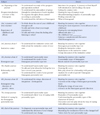Abstract
Purpose
The purpose of this study was to develop an enneagram program and to investigate the effects of the enneagram program on self-esteem, interpersonal relationship and GAF(Global assessment of Functioning Scale) in psychiatric patients.
Methods
A nonequivalent control group pre-post test design was used. Participants were 46 psychiatric patients. Participants were assigned to the experimental group(n=21) or control group(n=25). The experimental group participated in the enneagram program for 12 hours through eight sessions. The control group(n=25) received a routine nursing activity program.
Results
The experimental group that participated in the enneagram program showed higher scores for self-esteem(t=3.73, p=.001), interpersonal relationship(t=2.63, p=.012) and GAF(t=2.43, p=.019) compared to the control group.
Conclusion
The results indicate that an enneagram program for psychiatric patients is effective in improving self-esteem, interpersonal relationship and overall functioning skills. Therefore, it is suggested that an active use of this enneagram program as a nursing intervention for psychiatric patients would be beneficial.
Figures and Tables
Table 2
Homogeneity Test of Sociodemographic and Illness-related Characteristics of the Participants (N=46)

References
1. Ministry of Health & Welfare. The 2011 epidemiological survey of mental disorders among Korean adults. Epidemiology Report. Seoul: Ministry of Health & Welfare;2012. p. 11–16.
2. Corrigan P, Watson A. The paradox of self-stigma and mental illness. Clin Psychol (New York). 2002; 9(1):35–53. DOI: 10.1093/clipsy.9.1.35.

3. Wenzel A, Graff-Dolezal J, Macho M, Brendle JR. Communication and social skills in socially anxious and nonanxious individuals in the context of romantic relationships. Behav Res Ther. 2005; 43(4):505–519. DOI: 10.1016/j.brat.2004.03.010.

4. Jordan JV. The role of mutual empathy in relational/cultural therapy. J Clin Psychol. 2000; 56(8):1005–1016.

5. Hong SH, Yun JW, Lee JK, Kim JY. The effects of singing therapy on self-esteem and interpersonal relationship of psychiatric patient. J Korean Clin Nurs Res. 2006; 11(2):35–48.
6. Jun WH, Park JS, Yang S. The effect of dance/movement programs on self-esteem, depression, and anxiety in psychiatric inpatients. J Korean Acad Psychiatr Ment Health Nurs. 2009; 18(4):390–398.
7. WieH. Effect of Korean traditional plays on the emotion, relationship, and self-esteem of schizophrenics. [dissertation]. [Seoul]: Chung-Ang University;2008. 103.
8. Kim YY. The efficacy of self-esteem improvement education for persons with mental disability. J Res Educ. 2005; 22:155–176.
9. Jo GY. The effects of an integrative self-esteem improvement program on self-esteem, interpersonal relations, and quality of life for persons with mental disorder. J Korean Acad Psychiatr Ment Health Nurs. 2009; 18(4):439–448.
10. Lee KJ. Application of enneagram in the psychiatric nursing. J Korean Acad Psychiatr Ment Health Nurs. 2002; 11(3):285–303.
11. Youn YS, Cho SR. The effect that how the group counsel applying the enneagram affects the human relations and the adaptation of school life for sensitive juveniles. J Enneagr Stud. 2006; 3(2):11–35.
12. Ball E. Do professions have distinct or singular personalities? using the enneagram to support and facilitate inter-professional nursing. Nurse Educ Pract. 2009; 9(2):155–156.

13. Yang JS. Effects Enneagram workshop has on self-understanding and personal relationship. J Enneagr Stud. 2010; 7(1):29–55.
14. Hwang JH. An analysis of the effects of enneagram program for parent on communication style, child-rearing attitude, and self-esteem. J Enneagr Stud. 2010; 7(2):37–75.
15. Tapp K, Engebretson K. Using the enneagram for client insight and transformation: a type eight illustration. J Creat Ment Health. 2010; 5(1):65–72.

16. Koo HY. Effects of the enneagram group counseling program on self-esteem, anxiety and interpersonal relationships in nursing students. J Korean Acad Soc Nurs Educ. 2011; 17(3):444–453.

17. Lee JS, Kim YW. The enneagram program effect for stress management of college students. J Korean Acad Psychiatr Ment Health Nurs. 2004; 13(4):438–448.
18. Kim HK, Ji HS, Ryu EK, Jeon MK. Comparison of job satisfaction, organizational commitment, and burnout by personalities of nurses in hospitals-using Korean enneagram personality type Indicators: KEPTI. J Korean Clin Nurs Res. 2006; 11(1):109–121.
19. Kang MJ, Hah YS. Clinical nurses' job stress and stress coping style according to enneagram personality type. Korean J Stress Res. 2010; 18(1):1–10.
20. Lee KJ, Son BH. The effectiveness of enneagram program for self concept, role function, and quality of Life of chronic mental illness. Nurs Sci. 2006; 18(1):9–21.
21. Startup M, Jackson MC, Bendix S. The concurrent validity of the global assessment of functioning (GAF). Br J Clin Psychol. 2002; 41(Pt 4):417–422.

22. Lee JY, Cho MJ, Kwon JS. Global assessment of functioning scale and social and occupational functioning scale. Korean J Psychopharmacol. 2006; 17(2):122–127.
23. Faul F, Erdfelder E, Buchner A, Lang A-G. Statistical power analyses using G*Power 3.1: Tests for correlation and regression analyses. Behav Res Methods. 2009; 41:1149–1160.

24. APA Diagnostic Classification DSM-IV-TR[Internet]. Arlington (VA):American Psychiatric Association;2015. Available from: http://behavenet.com/diagnostic-and-statistical-manual-mental-disorders-fourth-edition.
25. Youn YS. Korean enneagram personality types indicator. Seoul, Korea: Korean Enneagram Education Center;2008.
26. Jon BJ. Self-esteem: a test of its measurability. Yonsei Nonchong. 1974; 11(1):107–130.
27. Bartlett C. The enneagram field guide: Notes on using the enneagram in counseling, therapy and personal growth. Portland, OR: The Enneagram Consortium;2010. p. 168.
28. KimWG. Effects of Korean enneagram program on the ego-identity, interpersonal relationship and self-leadership of nursing college students. [dissertation]. [Gwangju]: Chonnam National University;2013. 91.
29. Frequently Asked Questions about DSM-5 Implementation-For Clinicians[Internet]. Arlington(VA):American Psychiatric Association;2013. Available from: http://www.dsm5.org/Documents/FAQ%20for%20Clinicians%209-20-13.pdf.




 PDF
PDF ePub
ePub Citation
Citation Print
Print





 XML Download
XML Download